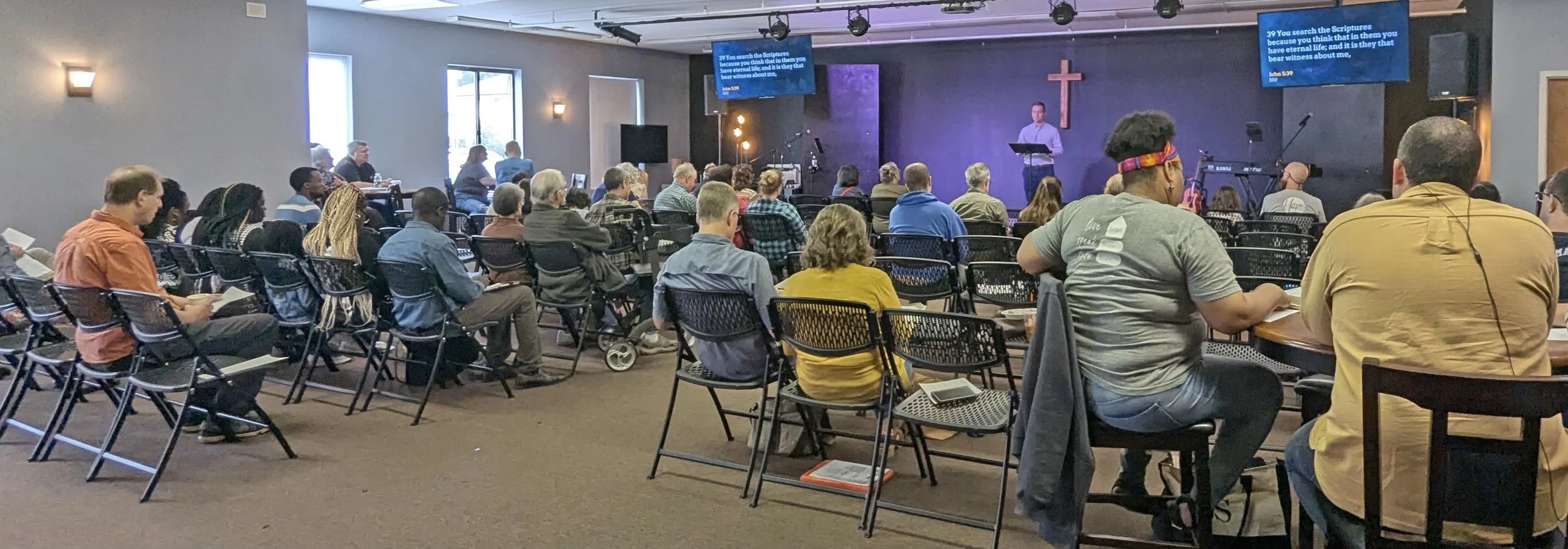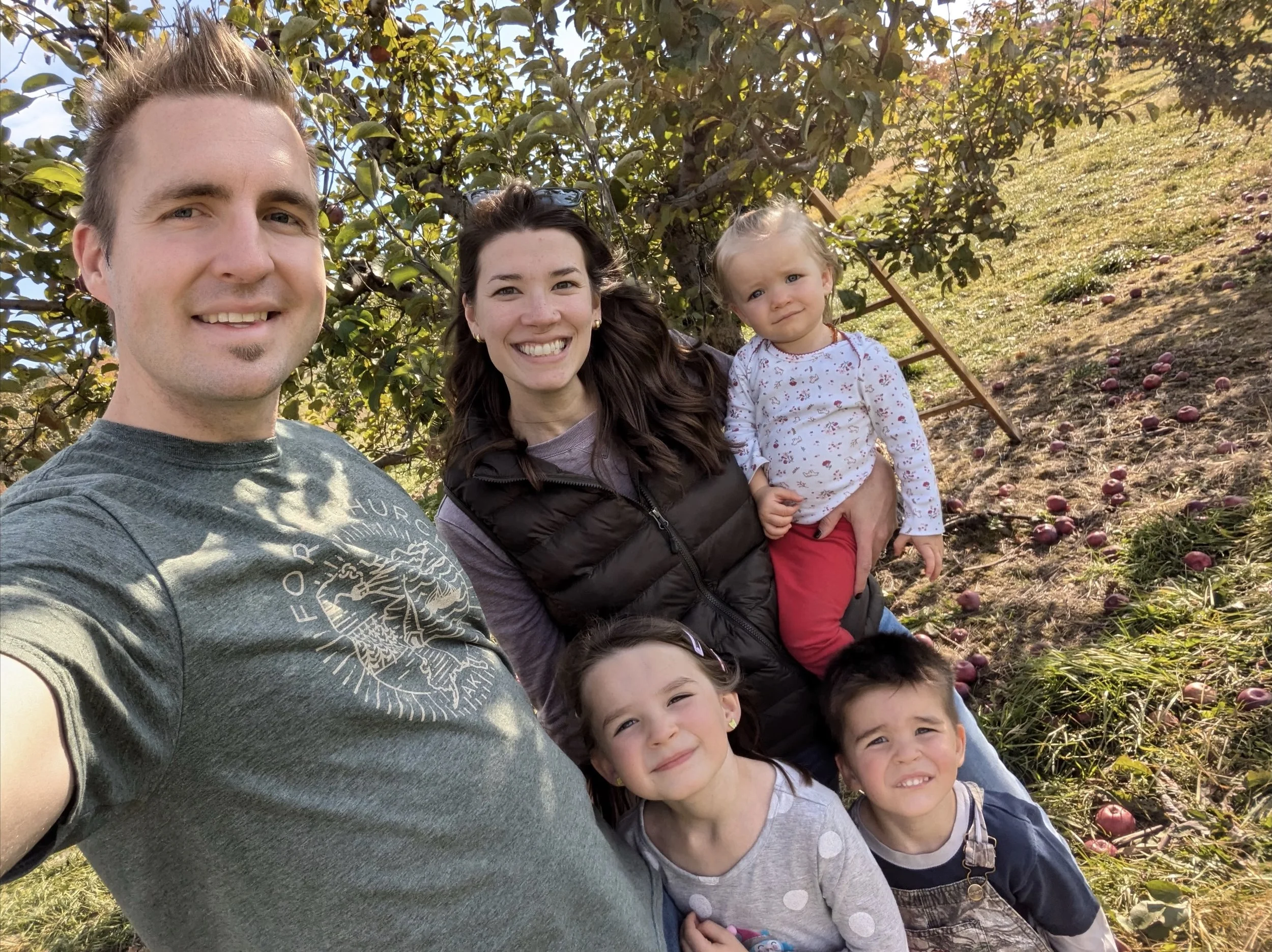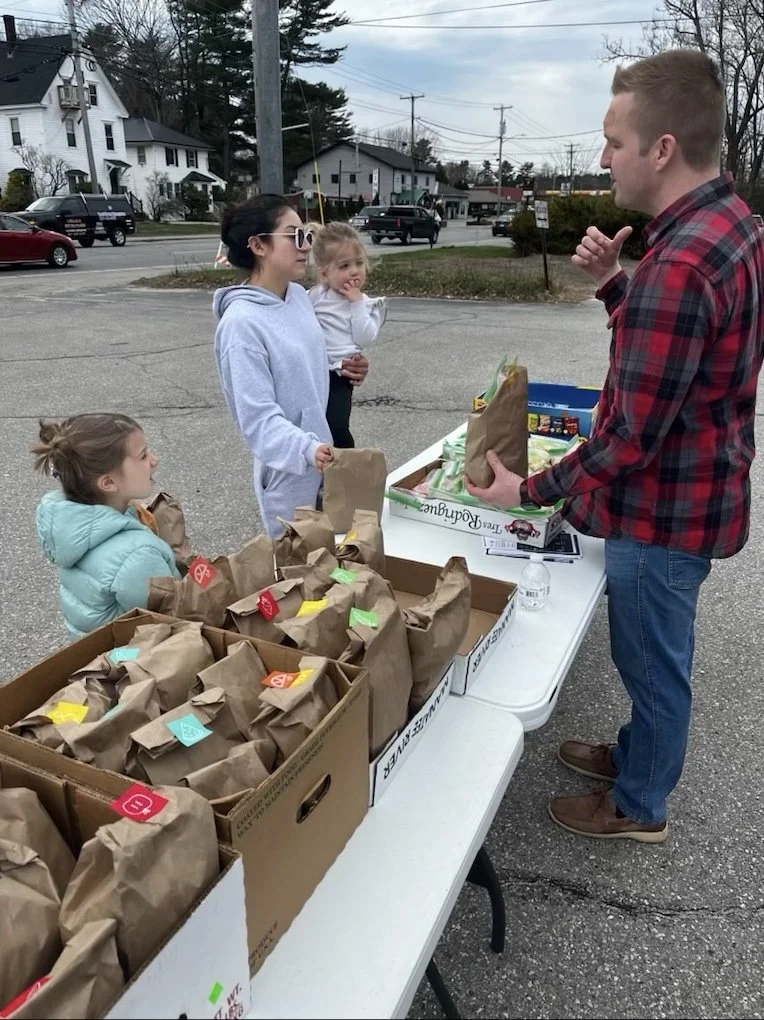Maine Pastor, Who Preaches “Growing in Community Together,” Prefers Corporate Gatherings Over Small Groups
Trevor DeField preached his first sermon (above) as lead pastor of Hope Church in Brunswick, Maine. He spoke about “the metanarrative of scripture, which points to Jesus as our hope.”
The members of Hope Church in the Midcoast Maine community of Brunswick invited Trevor DeField of mountainous, rural Colorado to be their next pastor before he ever preached a sermon for them.
After he made his first visit to New England, he and his wife of ten years, Erika, acted by faith and on the recommendation of the church’s intentional interim pastor, Roger Ferrrell, by uprooting their three young children in October and transplanting their lives to a region of rocky peninsulas, protected harbors, offshore islands, and tourists. A church planter coach, Ferrell leads Multiply Maine, which, like Hope Church, affiliates with the Baptist Churches of New England (BCNE).
Trevor and Erika DeField took their children to an orchard to pick apples. They look forward to making this “a regular rhythm of life” in Midcoast Maine.
Before moving to Maine, DeField worked “trivocationally” in Lake County, Colorado, as a computer programmer for Cutting Edge Custom Cabinets. During those years, he served as a youth pastor, children's pastor, worship leader, and head of family ministry, while also working in an orchard and on ranches, in welding and blacksmithing, in home building, and also mining for marble, coal, silver, and gold.
He graduated from Midwestern Baptist Theological Seminary (2024) with a pair of degrees, a Master of Theology and a Master of Divinity in biblical languages. He also graduated with a Bachelor of Arts in Biblical Studies (2015) from Northland International University, where he met his wife.
Not every pastor will reference the biblical languages while preaching, but DeField does. He tries to incorporate at least one insight from Greek or Hebrew into each sermon. “I am passionate about sharing the deeper insights of the Bible’s original languages in a fresh way that doesn’t alienate the audience but instead enriches their Christian living. I realize that this contradicts what is taught in many homiletical classes, but our congregation tells me they appreciate these insights.”
Hope Church was planted in 2017 by Brandton and Katie Wood. “Brandton and Katie were tireless in their efforts to reach people with the gospel. They planted churches in New Hampshire and Maine and also planted their lives in the hearts of many people,” said BCNE Executive Director Terry Dorsett. “They stayed faithful to Hope Church until they knew the leadership was solid and the church would remain healthy after their departure,” he added.
Encouraged by the Kindness of Mainers
“I had never been to New England before I came out to interview for this church. Roger did not ask me to preach when I came out here, which was a weird part of the interview,” DeField stated.
His misconceptions of Mainers were shattered during that initial visit. “I’ve always been told that people in New England are going to be stuffy and they’re going to be cold to you, but we’ve been really encouraged by the kindness of people—whether they’re in our church or just people in the community.”
Everyone the DeFields have met, he added, “have been really warm and kind and welcoming to us, and they’re just a great group of people to be around.” He noticed that “people are very blunt and forward. My wife and I are naturally that way, so we’ve been glad to find ‘our people’” in Brunswick, Maine.
DeField said, “Certainly the church is small but, for its size, it’s pretty diverse, which I think is rare in Maine and [Northern] New England.” The fifty-member congregation is both cross-cultural and multigenerational.
“We have quite a few young families. We also have a good number of singles, some teens and kids, and we also have older people and empty nesters. So, for this small church, we have a great diversity.”
The church serves immigrants from Angola, Burundi, Guatemala, Malaysia, and Mexico, as well as natives of the United States. “So we’re diverse ethnically too, which has been really exciting. That’s one of the things that drew us to the church,” the pastor said.
Growing Together in Christ
DeField’s vision for Hope Church, as detailed on the website, is that “we would be disciples of Jesus who are united in Christ and growing in community. I put that vaguely intentionally because I don’t know what God’s plans are for us.”
DeField and the church believe in expository preaching of the whole counsel of God for training in righteousness.
It seems he is more interested in church health than church growth—growing stronger rather than bigger. “If God’s plans were that we don’t grow numerically—ever, my plans would be that we grow spiritually in God, that we love Christ and each other more, and that we’re growing in community together.”
“Obviously,” he continued, “I would love for God to grow our church however he sees fit. If he wants to grow it numerically, that would be a delight for me, but if I’m here for thirty years ministering to a group of people of a similar size and we are helping people grow in Christ and in community, I would be delighted with that.”
In his expository preaching and while teaching, DeField, 33, tries to emulate the church-life model set forth by Dietrich Bonhoeffer, the Lutheran pastor who was known for his involvement in a plot to overthrow Adolph Hitler. In Life Together, Bonhoeffer writes about how to build a meaningful community through mutual affection for Christ and for each other. At Hope Church, DeField noted, “We’re doing life on life together and growing alongside each other, encouraging each other towards Christ.”
He draws particular inspiration for his pastorate from Paul’s words to the church at Corinth: “For what we proclaim is not ourselves, but Jesus Christ as Lord, with ourselves as your servants for Jesus’ sake. For God, who said, ‘Let light shine out of darkness,’ has shone in our hearts to give the light of the knowledge of the glory of God in the face of Jesus Christ” (2 Cor 4:5-6, ESV).
The “biggest struggle” the church faces is the burdensome expense of renting adequate space to meet their needs and “not having our own building. It’s becoming a pretty significant financial bear for us.” Two partnership churches in other regions of the country have committed to giving funds for two years. “We’re so thankful for that,” said DeField, “but it’s a two-year commitment, and after that, I’m not sure what God has for us.”
Corporate Gatherings Over Small Groups
Owning a church building is important to DeField for “multiple reasons”other than protection from snowstorms. “I think it shows a presence in the community. Our church is called Hope Church, and we’ve had people start coming to our church because they said, ‘Your sign says hope on it.’”
They encounter people who “are looking for some sort of spirituality and for some sort of hope, and they come into our doors.” “Inviting people into a home is good, but I think, if people are looking for a traditional type of service, then a good location is ideal.”
DeField serves the community by distributing free lunches to immigrants.
The leader always sets the tone of any organization, association, committee, or church, whether the group is large or small. A more important reason why Hope Church needs to purchase a building to call home is that DeField’s approach to church ministry centers on togetherness. “I love corporate gatherings together. This is something that we have tried to emphasize since we got here.”
His approach, many would say, is unconventional. “I’m kind of against small groups. I know there’s a big push right now for small groups. This church had small groups when I got here, and I ended them because I think that there were factions in the church. There was disunity going on, so we just combined them all.”
DeField commented that there was “some pushback and hesitation” about his approach. To replace small groups and encourage unity, the pastor added, on Wednesday nights these days, “We have one group of people who know each other really well and love each other deeply.”
The two-and-a-half-hour midweek gatherings begin with a family-style dinner and continue with Bible study and a prayer meeting. “We just mash it all up together on Wednesday nights.”
Once a month on Sundays, the church members host a meal for all who attend the worship, and during the week other times are set aside for Bible study and fellowship around food. On Saturday mornings and Thursdays, “smaller groups” are scheduled, but Wednesdays and Sundays “are kind of our big ones. Because of that, having a big building where we can host all of us, I think, is important,” he stated.
The church also encourages unscheduled and informal sharing, which they describe as “Home, Hope, Hospitality,” or simply “3H.” Families might invite a single person to their home for a meal, and a single person might treat a couple to coffee and pastries. Several families might go on a picnic together or meet at an ice cream shop, the pastor suggested. “We leave it open and vague.” The goals of 3H, the pastor noted, are “to disciple each other and to get to know each other in Christ. It is not simply casual hangouts.”
When the church previously held small groups, “people didn’t know each other. Our church has fifty people. People should know each other across the aisle from them, and people who have gone to church together for years should know each other, or at least know the names of people—but they didn’t even know the names of each other.”
When the DeFields arrived at the church, they saw an immediate need to cancel the small groups because the midweek gatherings in homes were operating as “their own individual churches.” Now, he concluded, the people “care about each other and are investing in each other’s lives when we’re at church and when we’re not at church. So, I’ve been really encouraged by that.”




